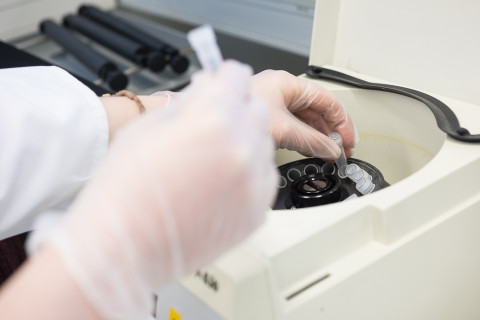The Academy of Finland’s Research Council for Health granted more than 1.2 million euros of funding to four Academy of Finland research projects at the University of Eastern Finland and Kuopio University Hospital. The projects use novel methods and approaches to study frontotemporal dementia, intracranial aneurysm and subarachnoid haemorrhage, stroke, and dementia prevention.
New insight into frontotemporal dementia from stem cell technology
Associate Professor Annakaisa Haapasalo secured 300,000 euros of Academy of Finland funding for the FiNeFTD project seeking to identify pathogenic mechanisms and new biomarker and druggable candidates in frontotemporal dementia using patient-derived skin fibroblasts and neurons. The project will be carried out in collaboration with Professor Anne Remes from the University of Oulu.
Frontotemporal dementia (FTD) is an early-onset neurodegenerative disease commonly affecting individuals who still actively participate in working life. Currently, FTD cannot be cured and there are no treatments which would affect disease progression. Furthermore, early diagnostics constitutes a challenge, as no specific diagnostic or prognostic biomarkers are available for FTD. The FiNeFTD project utilises genetically validated and well-characterised skin fibroblasts and fibroblast-derived neurons created by stem cell technology from FTD patients harbouring different genetic backgrounds, as well as healthy control subjects. These new patient-derived cells and clinical FTD cohort will be used to elucidate the molecular mechanisms underlying FTD pathogenesis and to screen for new candidate druggable targets and diagnostic or prognostic biomarkers.
Aneurysm register enables better disease classification
Professor, Chief Physician Juha E. Jääskeläinen secured nearly 450,000 euros of Academy of Finland funding for a project to be carried out at Kuopio University Hospital. The project will utilise the aneurysm register of Eastern Finland to introduce new, personalised treatments for intracranial aneurysm and subarachnoid haemorrhage.
About 3% of the Finnish population will develop aneurysms (IA) on intracranial arteries, with increasing age and female gender among the risk factors. Other risk factors include hypertension, smoking and presence of IA in the family. Annually, 350 people suffer subarachnoid haemorrhage (SAH). More than 30% die, and many are left with neurological and psychosocial problems. The Kuopio IA Group at Kuopio University Hospital has enjoyed Academy of Finland funding since 2008, and has studied IA and SAH in Eastern Finland extensively. The Kuopio IA Database contains 4,500 IA patients and their 52,000 relatives and 13,500 controls.
The project involves several work packages. One of the work packages aims at a detailed characterisation of unruptured IA disease, while others focus on familial penetrance of IA disease, molecular biology of IA wall, and comorbid common, rare or inherited diseases. The project also studies rare fusiform IA disease and long-term neurological, psychological and socio-economic outcome after SAH. Furthermore, the project will develop a novel Open Access Risk and Outcome Calculator for IA and SAH, as well as a novel IA Gene Panel to predict carriership of IA and comorbid diseases.
Human glial chimeric mice shed light on stoke recovery
Docent Jukka Jolkkonen secured 250,000 euros of Academy of Finland funding for a project that uses human glial chimeric mice as a novel tool for understanding functional stroke recovery.
Stroke is one of the leading causes of adult disability, causing a huge burden on patients, relatives and health care. Therapeutic options are limited, but a lot of hope is placed on restorative therapies. The aim of the project is to advance our understanding of human astrocytes in brain repair and plasticity after cerebral ischemia. The researchers have a unique access to human glial chimeric mice, which allow studies on spontaneous recovery and contribution of human brain diseases, such as Alzheimer’s disease, to the recovery process. Molecular profiling is expected to reveal novel targets for development of restorative therapies.
International research initiative works to prevent memory disorders
Professor Miia Kivipelto secured 250,000 euros of Academy of Finland funding for the World Wide FINGER (WW-FINGERS) project aiming at the prevention of memory disorders.
Effective prevention of dementia and Alzheimer’s disease (AD) is a global priority. The Finnish Geriatric Intervention Study to prevent cognitive impairment and disability (FINGER) was the first large trial showing that a multi-domain lifestyle intervention can prevent cognitive decline in at-risk elderly. The new World Wide FINGERS (WW-FINGERS) initiative will adapt and test the FINGER model in different participant groups and in different countries. The objective is to develop dementia prediction tools and to use them to select participants for WW-FINGERS trials. The project also plans and conducts joint trial analyses, and studies if intervention is more or less effective depending on the participant characteristics. Another objective is to implement the FINGER model on a multinational adaptive trial platform.
The multi-modal prevention approach is still new in the AD field. Ultimately, findings will facilitate the formulation of adequate policies and guidelines for dementia prevention.
Please see the university's telephone directory for the researchers’ contact details
